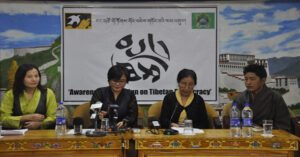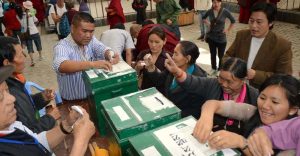
The results of a survey of the views of Tibetans with respect to democratic processes has been presented to Parliamentary representatives following a campaign to educate voters
In July the Tibetan Centre for Human Rights and Democracy (TCHRD) and Tibetan Women’s Association (TWA) organised a two-week campaign, Mangtso: Tibetan Democracy Awareness Tour, to encourage and promote free and open public discussion on some of the major issues related to the reform and strengthening of Tibetan democracy. Discussions were held in various Tibetan communities located in Dehra Dun, Delhi, Bangalore, Bylakuppe, Mundgod, and Orissa. Workshops were also held at four major academic institutions as well as two monasteries: Sera and Drepung.
“We began this campaign with the aim to create a bridge between the lawmakers and the general public so that the public’s suggestions will reach the authorities and subsequently, they will act accordingly”, said Tsering Tsomo, Executive Director of TCHRD.
Dolma Yangchen, President of TWA said, “Tibetans must recognise that the democracy given to us by His Holiness is not just a right but a responsibility as well. Hence, we must utilise this prize appropriately”.

File photo
During the campaign a survey was conducted on electoral issues, TCHRD reported. “Among the responses received, a little over 74% agreed that the current practice of holding two rounds of election for Sikyong and the parliament should be continued, although more than 74% said the time taken to declare the primary results should be shortened. About 54% of the respondents did not find the common date for Sikyong and parliamentary elections problematic. The two-vote privilege enjoyed by the monastic population is seen as undemocratic by 70%. But at the same time, more than 57% do not see any problem with monks and nuns taking part in politics”.
The full results of the survey will be incorporated in a in a special report on Tibetan democracy to be released in March next year. Videos of the various workshops are available at tchrd.org as well as Facebook and YouTube.
It was anticipated that the findings of the survey would be debated at the Tibetan Parliament sessions in September, but Electoral Reform was not on the agenda. . It is expected that these issues will be discussed in the March 2018 sitting of Parliament.
TCHRD works to protect the human rights of the Tibetan people in Tibet and to promote democratic principles in the exile Tibetan community.
TWA aims to promote the social, political, economic and educational empowerment of Tibetan women in exile, and to ensure their accessibility to adequate education and resources.




 Print
Print Email
Email